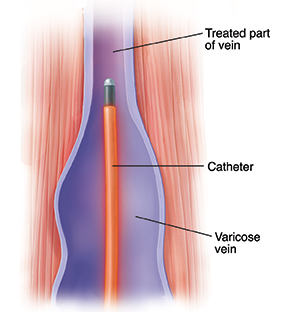Radiofrequency Ablation (RFA) Treatment for Varicose Veins
Radiofrequency ablation (RFA) is used to treat varicose veins. It uses heat made from radiofrequency (RF).
Varicose veins are swollen, enlarged veins. They happen most often in the legs. Varicose veins can occur when valves in your veins are damaged. This causes problems with blood flow. Over time, too much blood collects in your veins. The veins may bulge, twist, and stand out under your skin. They can also cause symptoms such as aching, cramping, or swelling in your legs.
During RFA, heat is sent into your vein through a thin, flexible tube (catheter). This closes off blood flow in the main problem vein.
 |
| With RFA treatment, a catheter that contains RF heat is used to seal off the main problem vein. |
Getting ready for your treatment
Follow any instructions from your healthcare provider.
Tell your provider if you:
-
Are pregnant or think you could be
-
Are breastfeeding
-
Smoke or use alcohol on a regular basis
-
Have any allergies or can't take certain medicines. Tell your provider how you reacted to these medicines in the past.
Tell your provider about any medicines you are taking. You may need to stop taking all or some of these before the test. This includes:
-
Medicines that can thin your blood or prevent clotting (anticoagulants)
-
All prescription medicines
-
Over-the-counter medicines such as aspirin or ibuprofen
-
Street drugs
-
Herbs, vitamins, and other supplements
Follow any directions you’re given for not eating or drinking before the procedure.
The day of your treatment
The treatment takes 45 to 60 minutes. The whole treatment (from preparing to recovery) takes about 1 to 3 hours. You can go home the same day. For the treatment:
-
You’ll lie down on a hospital bed.
-
An imaging method, such as ultrasound, is used to guide the procedure.
-
The leg to be treated is injected with numbing medicine.
-
Once your leg is numb, a needle makes a small hole (puncture) in the vein to be treated.
-
The catheter with the RF heat source is inserted into your vein.
-
More numbing medicine may be injected around your vein.
-
Once the catheter is in the right position, it's slowly drawn backward. As the catheter sends out heat, the vein is closed off.
-
In some cases, other side branch varicose veins may be removed or tied off through a few small cuts (incisions).
-
When the treatment is done, the catheter is removed. Pressure is applied to the insertion site to stop any bleeding. An elastic compression stocking or a bandage may be put on your leg.
Recovering at home
Once at home, follow all the instructions you’ve been given. Be sure to:
-
Take all medicines as directed.
-
Care for the catheter insertion site as advised.
-
Check for signs of infection at the catheter insertion site (see below).
-
Wear elastic stockings or bandages as directed.
-
Raise your legs as directed.
-
Walk a few times a day.
-
Don't do any heavy exercise, lifting, or standing for long periods, as advised.
-
Don't travel by air.
-
Don't take hot baths, use saunas, or use whirlpools, as advised.
Call your healthcare provider
Call your healthcare provider if you have any of the following:
-
Fever of 100.4° F ( 38° C) or higher, or as directed by your provider
-
Chest pain or trouble breathing
-
Signs of infection at the catheter insertion site. These include increased redness or swelling (inflammation), warmth, increasing pain, bleeding, or bad-smelling discharge.
-
Severe numbness or tingling in the treated leg
-
Severe pain or swelling in the treated leg
Follow-up
You’ll have a follow-up visit with your healthcare provider within a week. An ultrasound will be done to check for problems, such as blood clots. Your provider will discuss further treatments with you, if needed.
Risks and possible complications
These include the following:
-
Bleeding
-
Infection
-
Blood clots
-
Nerve damage in the treated area
-
Irritation or burning of the skin over the treated vein
-
Treatment doesn't improve the look or the symptoms of the problem veins
-
Risks of any medicines used during the treatment